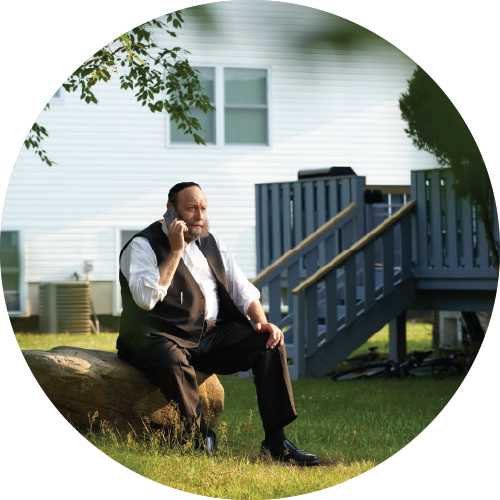All Our Children: The conversation continues

"When parents stop sacrificing their children upon the altars of self-image, we will have students who feel valued by, and love for, the systems they are in"

Unfairly Treated — Rabbi Meir B. Kahane, menahel, Chedvas Bais Yaakov, Yerushalayim
As usual, the insight of my dear friend and colleague Rabbi Shimon Russell in his expertly written article “All of Our Children” is uncanny.
As an educator for over two decades in both yeshivos and Bais Yaakovs and as the principal of a Bais Yaakov, I have had much exposure to both the successes and challenges in the classrooms of today’s Torah institutions. One of the points Rabbi Russell makes needs expansion.
He correctly addressed the need for our yeshivah and school systems to be emotionally safe environments for our children. Environments that allow the “vast majority of our children to feel truly capable of getting good grades” and not “feel like a failure.” He writes that “such feeling can erode the last remaining drops of self-esteem… and turns him against himself, his school, and our mesorah…” Absolutely correct.
However, I feel very strongly that the school systems, Bais Yaakov system, and yeshivah system are being unfairly targeted as the culprits of this issue.
The Torah world is a victim of its own incredible (read: miraculous) success. Our classrooms and schools are packed, baruch Hashem. What Klal Yisrael must realize is that such success makes it entirely unreasonable to expect a teacher or even a school to cater to every academic category and religious struggle. There are simply not enough resources or manpower. Consequently, schools must choose the levels they feel most qualified to cater to and build their system accordingly.
It is certainly true that many students are not getting what they need. But what is a school to do?
One obvious solution would be to create many types of schools catering to varying academic, emotional, and religious levels. Unfortunately, this is not a viable solution — and only partially due to a lack of resources and manpower. The shameful reality is that too many parents are unwilling to send their children to such schools and will push, lie, and even blackmail school administrators to get their child into more “prestigious’” institutions despite it being less than ideal for the child. The tragic truth is that parents would rather send their daughter to a “top” school or seminary and their son to a “top” yeshivah than to one that will actually build them.
I have many talented friends and coworkers who, in a heartbeat, would start schools catering to students who need assistance. Some have tried. These schools never get off the ground or close a few years later due to lack of registration.
It’s ironic that we yell and scream about how “the system” (usually said with a negative angry tone) doesn’t cater to our kids. Please ask yourself: Would you send your child to a school that does? Many parents would. But too many parents would not.
I personally know a number of parents whose children privately suffer religiously, some from drugs and alcohol. Yet those parents refuse to send their child to a school or program that caters to such struggles because es past nisht. I guess having an off-the-derech child is pas yah?
(As an aside, a large catalyst for the so-called crisis regarding a lack of Bais Yaakov high schools and seminaries is because many parents refuse to send their daughters anywhere but the “most prestigious” of schools, and get insulted if a school tells them their daughter is not right for their school. They then push and get their daughter in and when she doesn’t get what she needs, they blame the school. How backward. How can every girl go to a “top tier” school?)
Please don’t misconstrue my words. I am not claiming that there are no problems in the schools and yeshivos. There are problems everywhere — Adam ate from the tree. Certainly, there are teachers who make serious mistakes and handle things incorrectly and that is unacceptable. But if your daughter or son needs help academically or religiously (even mild), don’t expect that a school who does not claim to cater to those types of issues will handle your child’s challenges correctly. They don’t claim to be capable because they are not. And your child is your responsibility, not theirs.
Bashing the system is easy, but a red herring. The system is not the issue. When parents stop sacrificing their children upon the altars of self-image, we will have students who feel valued by, and love for, the systems they are in.
As an extension, making a child feel negatively about the school or system they are in will guarantee they hate it. Turning every mistake that a teacher makes into a flaw in the Bais Yaakov or yeshivah system will set your child up for an academic career of misery.
Even without verbalizing negativity per se, simply having lower standards than the values being taught in the school builds disrespect and negativity for the school. If you choose to send your daughter to a stronger school, you must raise your own standards. If you cannot raise your own standards, send them to a school with weaker standards. Oh, wait, I forgot, you can’t do that! Es past nisht. I hear. It’s easier just to blame the system.
Where Credit Is Due — Devorah Sasson
Thanks for your magazine, I enjoy it each week.
This week’s Guestlines by Rabbi Shimon Russell had great points, but unfortunately didn’t give credit to the person who developed “The Four S’s.”
This idea was developed by Dr. Dan Siegel in his series of books about parenting (which are grounded in attachment theory — an interesting topic in itself).
I particularly enjoyed Gedalia Guttentag’s “Open Mic” piece. I think he said things that no one is saying. Not every kid goes off the derech because they are damaged, traumatized, or in pain. Thank you for printing it.
A Third Explanation — Parents of a Questioning Teen
The “Open Mic” article in the August 4th issue of Mishpacha notes that the phenomenon of youth from Orthodox families abandoning the frum lifestyle cannot solely be explained by trauma and hurt. The article correctly mentions a second factor — the allure of the secular world.
That too, however, does not fully explain the reality. There is often a third explanation. Some of our youth have questions of belief, and are not finding satisfactory answers to the big questions of life and faith. Common, clichéd answers such as “we have a mesorah,” or extolling the beauty of Shabbos, do not tend to work well for these individuals. If we want to keep these children on the path, we need to think beyond “unconditional love” and “just love them,” and give them answers that truly satisfy their questions and quell their doubts. All branches of the Orthodox community should give some serious thought about how to best approach this challenging phenomenon.
Doubly Bereft — A Parent in Pain
I’d like to thank Gedalia Guttentag for expressing so well that which I have felt for so long.
I am choosing to remain anonymous because most people in our society have still not come to understand that bechirah goes both ways, as Gedalia pointed out. Therefore, hearing of any non-conforming children, the first reaction is to look for “the reason.” How hurtful this is to the parents and siblings of those who chose “out.”
We would prefer not to have people talking behind their hands about us or our erliche children. We would prefer not to expose our family members, many of whom are klei kodesh or mechanchim and mechanchos, to the scrutiny of people who look for skeletons in everyone else’s closets, casting a jaundiced eye on the innocent and possibly eroding the effectiveness of their contributions to Klal Yisrael.
One danger of always attributing the choice to leave Yiddishkeit to pain and abuse is that the response that is appropriate for that situation is definitely not appropriate for a child who chooses to follow taavah and justifies it with pseudo-intellectual thoughts.
Our child left our home to pursue his own lifestyle, but maintained close bonds with his siblings. We consulted rabbanim, therapists, and counselors. All agreed that it would be best for us to encourage the other children to keep in touch with their sibling, to meet, go on outings, etc. The mentor who knew our child well assured us that he would not attempt to influence the others, since our child acknowledged that he was suffering emotional and not hashkafic pain, and that our child is a good and trustworthy person.
We were told to be loving and accepting, and not to push Yiddishkeit, either in action or thought — not to ask him to conform to community norms when he visited, not to make our Shabbos table “too Torahdig,” to minimize hashkafah or halachah talk in favor of family shmoozing, and so on.
So we did. And we lost another child.
We did not discourage or monitor their conversations or meetings. We trusted our older child, we trusted those who had advised us, and we hoped for the best. But nothing prepared us for the worst.
Should we all have noticed that there were none of the usual reactions to abusive treatment? Our child was not on the streets, not doing drugs, not hanging out with unsavory friends. In fact, he was earning respect as a success in his chosen field, making good money, and living well. Should that have been a warning sign that it was not “pain” that caused his exit? Should we have spent more time with our other children discussing hashkafah, rather than sympathy for their sibling’s angst? Could we have gotten a different result if we had used a different response?
I have heard that to say “I could have...” is apikorsus. Hashem gave us the knowledge and advice He wanted us to have, and there was nothing else for us to do but follow instructions.
But it still hurts. And I still feel guilty.
So what do we do? We let our tears soak the Tehillim, we take solace in the words of Dovid Hamelech, who himself suffered such anguish from his children (two of whom actually tried to murder him), yet he continued to daven for their redemption. “Avshalom, bni…”
Layers of Pain — A Sister Who Knows
I am the younger sister of what you call “off the derech” brothers. Not brothers who are tattooed or green-haired, not alcoholics or addicts, but exactly what Mr. Guttentag describes, smart, gifted boys who have “chosen” the second option. Chosen to go astray in search of what seems to be taavah, and intellectualism. Dressed exactly to match the criteria of “teens who simply opt out of frum life for something cooler.”
And I used to think exactly like he does. I assumed that there must be something out there that’s attractive and luring these intelligent thinkers. Something that I might still be too young to be aware of or understand, but is forceful enough to be pulling my brothers, who I had always admired and respected, to go an unfamiliar route and destroy the family in their wake. On occasion they’d even be the ones to say to me, “When you grow up, you’ll understand.”
And so, I waited, for years and years to understand. I still don’t know exactly how I thought it would play itself out, but after expecting it for many years, it happened.
No, I didn’t leave the folds of anything. I didn’t change my dress code, lingo, or friend group. I simply changed my perspective, my mindset, and my understanding.
It happened when the most talented and charismatic brother of the bunch, the one I always banked on for proof that not only shallow kids who have been burned and couldn’t make it through the system go off, who was literally in yeshivah till he was 23, related an experience in a moment of vulnerability. He choked out one Shabbos afternoon an astonishing revelation that still has me cold and shivering as I write.
A few of us were sitting around as he reminisced about those days when he “did believe in Hashem” when he’d lie in his bed in his yeshivah dorm room at night and wait till the lights went out so he could cry and beg Hashem not to wake him up in the morning. I watched the tears well up in his eyes, I saw the shudder and quiver pass over his body, and I’ve been forever changed from that moment on.
Can you imagine that a successful-looking college student, who has graduated multiple programs and holds more than one degree, can still cry thinking about the intensity of the emotions he felt as a young boy of about 14, when over 15 years have passed since? Can we even try to measure the magnitude of the pain and low self-worth he must have been experiencing to be asking Hashem to die at such a young stage, when his peers were probably busy with kumzitzen or sports?
No matter how hard kids in pain try to assure you that they are just like you — only enjoying their lives more — know, that under all those layers of self-defense and self-glorification to prove that they are better off than anyone else, there are layers and layers of pain and pain and more pain. Their past is pushing them forward. There is no doubt that they’ve been through more than you imagine and if you don’t see it at first glance, you’re obviously not close enough to the person in question. You’re likely judging and deciding without knowing real facts or feelings
So, though I’m still young and my experience is limited, life has taught me to believe that exactly the opposite of the article is true. There are almost “no teens or adults who have never been abused or bullied but still leave frum life!” And no, it’s not “all about joining the fun, looking like most people your age, and indulging in urges with abandon.”
No one gives up everything they’ve got just for fun. If someone is prepared to trade in their whole life, their family, their comfort zone, every acquaintance, and habit they’ve known, to face their fate in an unknown world, they’ve obviously found themselves in such a low that they considered this their only shot left to pitch.
Attachment Is the Key — Rabbi Gershon Schaffel, rav, Young Israel of Skokie; dayan, Chicago Choshen Mishpat Kollel and the Business Halachah Institute
Although unsolicited, I would like to join the conversation between Rabbi Russell and Rabbi Guttentag from last week’s issue.
Rabbi Russell has been talking about the impact trauma and, more importantly, microtrauma, has on children. He often quotes his rebbi, Rav Mattisyahu Salomon shlita, who says that we should not refer to OTD children as “drop-outs, but “push-outs” due to the many contributing factors that the system is responsible for that leads children “off the derech.”
Rabbi Guttentag, however, raises an interesting point. What about the children who were not traumatized but were not inspired and thus exercise their bechirah to choose a secular lifestyle?
There is an important factor that addresses not only the impact of trauma but even those who exercise their bechirah in choosing the glitzy, immediate gratification world of secular society. The common denominator of both phenomena is the child’s lack of attachment to either his parents, the system, or both.
Attachment is one of the most powerful forces in the universe. The ultimate in life is our deveikus with Hashem. Hashem wired us with the need to attach. As newborns, we are completely helpless and rely on our attachment with our parents for survival. Throughout our lives, we are managing our attachments and will almost always choose attachment. Children seek attachment in times of danger, and the urge for attachment overpowers their survival instinct.
When attachment roots are firmly in place, children can weather the storm of theological and philosophical questions that cannot be answered. Though Moshe Rabbeinu could not understand why the righteous suffered, his attachment to Hashem preserved his faith. But a child who is not attached to parents, grandparents, rebbeim, or morahs will seek attachment elsewhere and that is with their peers.
Peer pressure becomes an active force in a child’s life when our children are not attached to a charismatic adult in their lives. A major indicator of whether kiruv efforts will be successful, referenced by Rabbi Guttentag, is whether the kiruv candidate is attaching to the mekarev or not.
As Rabbi Russell indicates, brutal honesty and an accurate assessment of where we stand is the most important step to address and resolve the most important challenge we face in chinuch.
I applaud Mishpacha magazine for bringing the issue to the consciousness of our community and hope that we can work together to assure that every last one of our children has the benefit of deep attachment with parents, rebbeim, and morahs, and ultimately, with Hashem.
Wanted: A Sense of Mission — Ayala Brown
In response to Gedalia Guttentag’s essay about kids who make the choice to leave Yiddishkeit, I would like to offer one theory for why that happens. As he says, if we can identify the problem, we can work on a solution.
I am not a rav or even an askan. I can only offer the perspective of a mother of school-age and teenage children, the “boots on the ground,” so to speak.
The community, baruch Hashem, has matured. We have many institutions that support our lifestyle and an organization for practically every need. These are all good things.
But as a result of all those good things, I think sometimes kids feel they aren’t needed. They are born into a huge, basically functioning system. They never have the opportunity to make choices. The system has made all the choices for them.
Kids today are growing up without a sense of mission. They are not rebuilding Yiddishkeit after a war. They are not fighting a particular movement. Teenagers in general struggle with a need to “find their place.” Everyone needs to feel needed. But for today’s teens, that inevitable question of “where do I belong, what gives me value?” is not easily answered.
Further, some kids (many more than we would like to acknowledge) experience rejection by the system. They are not easily accepted to elementary or high school, or they have friends or siblings who were not easily accepted. And our girls grow up in fear that no one will want to marry them.
The message they absorb is: We don’t need you. And the yetzer hara is strong...
This does not mean every kid with such experiences will leave Yiddishkeit. But without a sense of their own value and importance to the klal, kids are more likely not to identify with the whole.
I wonder what can be done. A strong family unit can definitely mitigate some of this effect, as may a rebbi or teacher who explicitly addresses the value of every Yid and of every mitzvah.
But on a systemic level, how can we give our kids a sense of mission and inspiration strong enough to motivate them to cling to the ways of the Torah?
(Originally featured in Mishpacha, Issue 874)
Oops! We could not locate your form.









